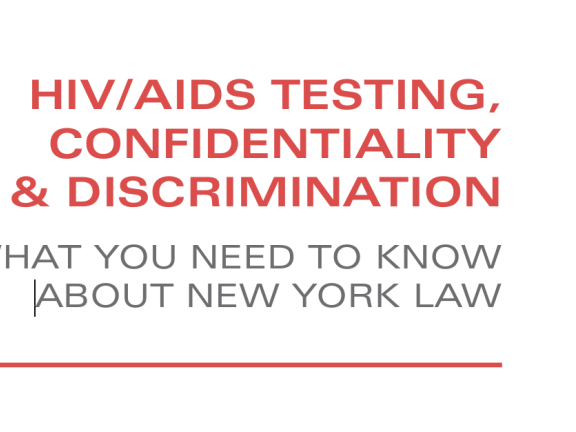Published April, 2016
HIV/AIDS Testing, Confidentiality & Discrimination: What You Need to Know About New York Law, Legal Action Center (2012 with 2016 Supplement)

This manual by the Legal Action Center on New York State's HIV testing, confidentiality, and discrimination laws has been updated to reflect April 2014 amendments to New York State law eliminating the requirement for written consent for an HIV test except in correctional facilities and in authorizing the Department of Health to use and redisclose HIV-related information for purposes of linkage and retention of care. It provides detailed discussions of New York's HIV testing and confidentiality law, HIPAA's federal health privacy rules, and anti-discrimination laws that protect people with HIV/AIDS. While the resource is primarily useful to health, service, and legal providers within New York State, there is also information concerning federal privacy protections.
The manual covers HIV testing (including informed consent requirements and when testing can proceed without informed consent), confidentiality and the laws that govern HIV-related information disclosure, and protection against HIV-related discrimination. The appendix includes useful model forms.
For updates to this manual and a general overview of HIV/AIDS Confidentiality law in New York State, visit the Legal Action Center and its HIV/AIDS: Confidentiality & Testing Resources where you can also find additional training materials on How To Create and Update Your Agency's HIV Confidentiality Policies & Procedures and Ensure Staff Compliance (2016) and Client Advocacy: What To Do When Your Client's HIV Confidentiality or Testing Rights Have Been Violated (2014).
Copyright Information: CHLP encourages the broad use and sharing of resources. Please credit CHLP when using these materials or their content. and do not alter, adapt or present as your work without prior permission from CHLP.
Legal Disclaimer: CHLP makes an effort to ensure legal information is correct and current, but the law is regularly changing, and the accuracy of the information provided cannot be guaranteed. The legal information in a given resource may not be applicable to all situations and is not—and should not be relied upon—as a substitute for legal advice.